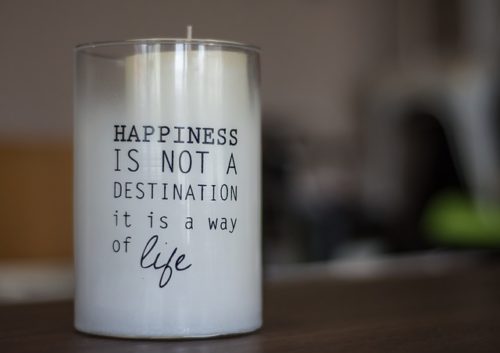by Snigdha Mohanty
Ask anyone, “What do you want in life?”, and the most common answer would be “I want to be happy.” Everyone seems to be on a perpetual quest for happiness in their own way. And everyone seems to be working for that happiness!
However, if we pause and reflect, we will realise how we ourselves have made it so tough to be happy! The truth is: happiness is meant to be our core state of being, having nothing to do with anything outside. But, when one works for happiness, he or she seeks it out at the destination, conditional upon achieving a specific goal. We keep telling ourselves that we will be happy if we get that luxurious car, that exquisite dress or if we top the class, if we crack that exam, if we get that promotion, if we marry, if our children land a high-paying job etc. – material goals that pop up endlessly relating to wealth, status, fame etc. That too, very often, it is not only about one achieving a goal personally, but also about our loved ones achieving targets we set for them! It is not wrong to want to achieve these things, or to enjoy our success in these fields. The problem is we seek joy in the outcome at the goalpost, not in our input along the way. So instead of being happy about how we are doing at the moment, we constantly worry about how to achieve the goal, and worse still, we sometimes even compromise on our values, neglect our relationships, if need be. In the process, we grow anxious and guilty while working towards our goals. If we fail, we end up unhappy. Ironically, though, even on achieving that goal, the happiness that we experience turns out to be very momentary and eludes us soon after.
And that’s because our goalpost keeps shifting, every time we achieve a goal!
Goals are never meant to be static in life as long as they have to do with our outer world. Our mind has an uncanny knack of picking on that one little thing that we do not have, thereby rendering useless all that we already have. So, unless we cultivate contentment as a core value, we can never be truly happy. With contentment, we are happy ‘now’ and we work with happiness for the next. If we achieve the goal, we are happy and keep working with happiness. Even when we fail (and we do fail several times in life), the fact remains that we have been happy doing what we had been doing! And this, in turn, empowers us inwardly to keep staying happy, fully understanding that we have done our best and there is always another chance! Since in any case, as a contented person, we are working with happiness, it never eludes us, whether we achieve or fail.
In fact, only with contentment comes the realisation that happiness is a state of being, and is not conditional upon anything external.
So, it is very important to understand contentment, one of the most misunderstood terms! Understood in proper perspective, this one word can become the bedrock for everything right in our lives.
Very often, when we say or hear the one-liner “I am content”, do we mean, we are fine with the as is in the sense of not feeling the urge to crib and complain, and instead focus on working harder and better; or do we try to justify our laziness, inaction and lack of drive in the name of being contented, implying there is no more need for us to aim higher, or work smarter? If your answer is in line with the first interpretation, you are definitely on the right track.
However, it is confounding to see how most of us commonly interpret contentment as passivity – being satisfied with what we have, not out of a sense of true acceptance, but more out of being resigned to what we have, in surrender to the status quo. No, it is not so. Contentment never means you be satisfied with what you have, and have no ambition or aspiration for the better. Rather, it means that when we are satisfied with what we have got now, we are not frittering away our energy in negative and/or waste emotions, thereby conserving our energy, our inner power that we will use to work for better and higher goals.
One doesn’t stop working further because he or she is contented and happy; instead one works better and on higher goals.
Contentment teaches us to work with happiness, as against, working for happiness!
And we can work with happiness, only when we are grateful for the things that we have.
How can we be happy now, if we focus on and crib about what we lack? When we have gratitude as a core value, even if we lose sometimes, we will always find out what we still have and what we still can create. More significantly, we would always look at ourselves for the person we are becoming through self-transformation by remaining grateful for everything or every lesson.
We cannot be happy, if we are not contented; and we cannot be contented, if we have no sense of gratitude!
Going a little deeper, it is truly enlightening to appreciate how the universal values, viz. gratitude, acceptance, contentment and abundance are fully inter-woven – feeding on & being fed by one another! Start at any point and we are eventually at abundance, from which it creates more and more abundance, happiness and bliss. When we are grateful, we accept situations and people with understanding. When we accept, we let go of expectations from others/outside, even own selves. we just be, and let others be. Once we do not really expect, we are contented. Once contented, we feel abundance, devoid of any feeling of envy or longing, or any sense of lack. Once we feel abundant, on one hand we work with greater energy to achieve more, and on the other hand, we become generous – sharing with others, out of our sense of abundance. Sharing brings with it abundant joy and happiness. This again creates another virtuous circle of higher positive energy, happiness, gratitude, contentment, acceptance, higher energy, higher achievements, greater sharing, higher joy and elevated energy exchanges…. And the process becomes not only self-perpetuating, but spiralling upward, continuously expanding.
For most of us, our natural tendency is to notice the nine bad things that happen to us each day. But instead, what if we make a habit of looking for one single thing that we are grateful for, every day? And express gratitude in writing each day? Then we will automatically look out for and focus on that one good thing that also happens to us during the day amidst the nine bad things!
This way, a habit of looking for the good gets formed. Over time, it gets into auto mode, and becomes a part of our personality and character. Not only that, something else too happens. When we are busy looking out for the good, our attention gets diverted from the bad things, and whatever is starved of attention, stops growing. Nothing less than a miracle unfolds here, in the process. Our mind-space for good keeps growing, literally pushing out the bad and the wasteful, which stops getting registered in our mind gradually. What gets registered in mind only leads to any feeling, and with the habit of looking for and at the good, only good gets registered and creates good feelings. And the process continues. Eventually, is not happiness about good feelings inside? You are happy; you work with happiness; you are content with the result; so undisturbed, you keep working with happiness and to your best capacity. Happiness then becomes your core state of being.







Thx Rahul! Your feedback is of great value. Really appreciate.
hey, thanks a lot, Soumya, Sneha and Sarajevo! Appreciate.
Snigdha has written a very fine and insightful piece on importance of contentment in life, and HOW TO shape our thinking in daily life to achieving it. She makes a very substantial point in differentiating between the pursuit of happiness and learning to live with happiness. This piece is a complete nugget of wisdom ! She has also written other such insightful pieces in this mag and I truly look forward to hearing more from her. Thanks for sharing with us.
Life is too short to not to be happy and this is undoubtedly an enlightening read.
Loved this post on Ms. Mohandas on happiness. Very nicely explained with deep personal understanding.
Please note that the writer’s name Snigdha Mohanty
Fantastic read & a refreshing take on some evergreen concepts.